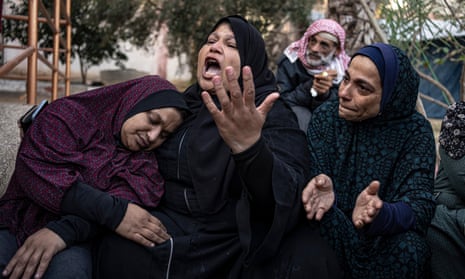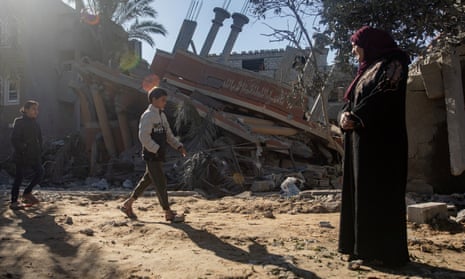Southern Gaza bombed as Israel renews offensive
Israel pounded targets in the southern Gaza Strip on Saturday, intensifying its renewed offensive after the weeklong truce and giving rise to renewed concerns about civilian casualties.
Associated Press reports that the attacks on Saturday were focused on the Khan Younis area in southern Gaza, where the military dropped leaflets the day before warning residents to leave.
As of late Friday, however, there had been no reports of large numbers of people leaving, according to the United Nations.
“There is no place to go,” lamented Emad Hajar, who fled with his wife and three children from the northern town of Beit Lahia a month ago to seek refuge in Khan Younis.
They expelled us from the north, and now they are pushing us to leave the south
Some 2 million people – almost Gaza’s entire population – are crammed into the territory’s south, where Israel urged people to relocate at the war’s start and has since vowed to extend its ground assault.
Unable to go into north Gaza or neighbouring Egypt, their only escape is to move around within the 220 sq km (85 sq mile) area.
The Hamas-run health ministry said nearly 200 people had been killed since the truce ended early on Friday.
Key events
The first aid trucks since the collapse of the Gaza truce have entered through the Egyptian side of the Rafah crossing on Saturday, on their way to Awja crossing for inspection before continuing the journey to the Gaza Strip, Egyptian security, and Red Crescent sources told Reuters.
Two fuel trucks and 50 aid trucks went through the Egyptian side heading to Awja for inspection, the sources added.
Here are the latest images coming across the wires:
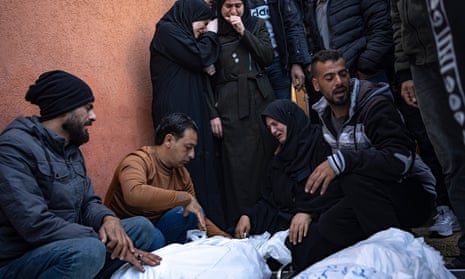

Turkey’s president, Recep Tayyip Erdoğan, said that the chance for peace in Gaza after the humanitarian pause was lost for now due to Israel’s uncompromising approach, broadcaster NTV reported on Saturday.
“We have always emphasized that we are in favour of a permanent ceasefire rather than a humanitarian break … There was an opportunity for peace here, and unfortunately, we have lost this opportunity for now due to Israel’s uncompromising approach,” Erdoğan was quoted as saying by NTV and other Turkish media, according to Reuters.
The truce that started on 24 November had been extended twice. But after seven days during which women, children and foreign hostages were freed as well as a number of Palestinian prisoners, mediators failed to find a formula to release more.
Since then Israeli airstrikes and artillery bombardments have hit southern Gaza, extending the nearly two-month-old war in which thousands of people have died.
Speaking to reporters on his way back from the United Arab Emirates, Erdoğan also said that he is not losing hope for a lasting peace in the conflict adding that Hamas could not be excluded from its potential solution, according to NTV.
“We need to focus on the two-state solution … The exclusion of Hamas or destruction of Hamas is not a realistic scenario,” Erdoğan said during the interview, adding that he would not define Hamas as a terrorist organisation.
Separately, sources told Reuters that Israel has informed several Arab states that it wants to carve out a buffer zone on the Palestinian side of Gaza’s border to prevent future attacks as part of proposals for the enclave after the war ends.
Erdogan also said a contact group formed by the OIC and Arab League would visit the United States to discuss possible resolution of conflict in Gaza after meeting with authorities in London, Paris, Barcelona and the United Nations.
Israeli forces and Hezbollah militants exchanged fire across the Israel-Lebanon border on Saturday, in a second day of hostilities after the collapse of a truce in Gaza between Palestinian group Hamas and Israel.
Iran-backed Hezbollah said in a statement that one of its fighters was killed but did not specify when. Three people in south Lebanon were killed by Israeli shelling on Friday, according to Lebanon’s state news agency. Hezbollah said two of the dead were its fighters, Reuters reports.
Hezbollah also said it fired rockets at an Israeli position. Israel’s military said two mortar bombs launched from Lebanon fell in open areas in Shomera, across the border from the south Lebanon village of Marwahin. The military said it responded by attacking the launch site and elsewhere in south Lebanon.
Earlier on Saturday, shelling from Israel hit close to the United Nations interim force in Lebanon (Unifil) headquarters near the coastal town of Naqoura and around the border village of Rmaych, a Unifil spokesperson said.
The Israeli military said it carried out shelling near Naqoura after spotting “unusual activity” in the area.
Unifil also detected fire around 11am. (0900 GMT) from the area of Tayr Harfa, about a mile from the Israeli frontier, toward Israel, the spokesperson said.
Following the eruption of the Hamas-Israel war on 7 October, Hezbollah mounted near-daily rocket attacks on Israeli positions at the frontier while Israel waged air and artillery strikes in south Lebanon. But the border was largely calm during the week-long truce in the Gaza war.
It has been the worst fighting since the 2006 war between Israel and Hezbollah, a Hamas ally.
Just over 100 people in Lebanon have been killed during the hostilities, 83 of them Hezbollah fighters. Tens of thousands of people have fled both sides of the border.
A protester with a Palestinian flag self-immolated on Friday outside the Israeli consulate in Atlanta, injuring a security guard who attempted to intervene, authorities said.
The person, whom officials did not identify, is in critical condition, the Atlanta police chief, Darin Schierbaum, said at a news conference. The guard’s condition was not immediately clear.
“We believe this building remains safe, and we do not see any threat here,” the chief said. “We believe that was an act of extreme political protest.“
Lebanon’s heavily armed Hezbollah said in a statement that one of its fighters was killed in south Lebanon on Saturday, Reuters reports the day after the collapse of a truce between Israel and the Palestinian militant group Hamas led hostilities to flare at the frontier.
Renewed fighting in Gaza stretched into a second day on Saturday after talks to extend a week-old truce with Hamas collapsed and mediators said Israeli bombardments were complicating attempts to again pause hostilities.
Eastern areas of Khan Younis in southern Gaza came under intense bombardment as the truce deadline lapsed shortly after dawn on Friday, with columns of smoke rising into the sky, Reuters reports.
Residents took to the road with belongings heaped up in carts, searching for shelter further west.
Israel said its ground, air and naval forces struck more than 200 “terror targets” in Gaza. By Friday evening, health officials in the coastal strip said Israeli strikes had killed 184 people, wounded at least 589 others and hit more than 20 houses.
Early on Saturday, rocket sirens sounded in Israeli communities outside Gaza, but there were no reports of serious damage or casualties. Footage of Gaza, taken from southern Israel, included the sounds of explosions and showed smoke rising into the sky.
The warring sides blamed each other for the collapse of the truce, during which Hamas militants had released hostages in exchange for Palestinians held in Israeli jails.
The United Nations said the fighting would worsen an extreme humanitarian emergency. “Hell on Earth has returned to Gaza,” said Jens Laerke, a spokesperson for the UN humanitarian office in Geneva.
A pause that started on 24 November had been extended twice, and Israel had said it could continue as long as Hamas released 10 hostages a day. But after seven days during which women, children and foreign hostages were freed, mediators failed to find a formula to release more.
Israel accused Hamas of refusing to release all the women it held. A Palestinian official said the breakdown occurred over female Israeli soldiers.
Israel has sworn to annihilate Hamas after an 7 October rampage in which it says the militant group killed 1,200 people and took 240 hostage. Israeli assaults since have laid waste much of Gaza, ruled by Hamas since 2007. Palestinian health authorities deemed reliable by the United Nations say more than 15,000 Palestinians have been killed and thousands are missing.
Here are the latest images coming across the wires:
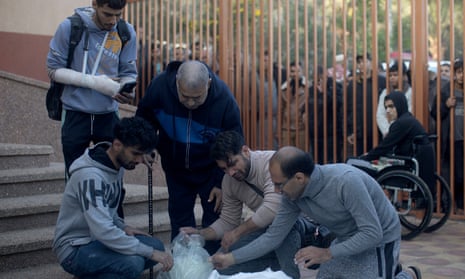


Israeli airstrikes killed two Syrian pro-Hezbollah fighters when they hit sites belonging to the Iran-backed group near Damascus early on Saturday, a war monitor told AFP.
The strikes near Damascus came less than 24 hours after the end of a Gaza truce between Hezbollah ally Hamas and Israel.
“Two Syrian fighters working for Hezbollah were killed and seven other fighters working for the group were wounded in Israeli airstrikes on Hezbollah sites near Sayyida Zeinab,” said Rami Abdel Rahman, who heads the Syrian Observatory for Human Rights.
Israel has launched hundreds of airstrikes on its northern neighbour since Syria’s civil war began in 2011, primarily targeting Iran-backed forces and Lebanese Hezbollah fighters, as well as Syrian army positions.
But it has intensified attacks since its war with Hamas began in October. Hamas last year said it had restored relations with Syria’s government.
The chief of the British-based monitor, which has a network of sources inside Syria, had earlier told AFP that Israel struck “Hezbollah targets” in the Sayyida Zeinab area south of Damascus.
Syria’s defence ministry had also said Israel hit near the Syrian capital, with an AFP journalist in Damascus reporting the loud sound of bombings.
“At approximately 1:35 am (2235 GMT) today, the Israeli enemy carried out an air assault from the direction of the occupied Syrian Golan, targeting some points near the city of Damascus,” the defence ministry said in a statement, reporting no casualties.
Syria state television had reported an “Israeli aggression near the capital”.
The Israeli army did not comment when contacted by AFP.
Strikes on Gaza resume after Israel accuses Hamas of breaking truce – video
Southern Gaza bombed as Israel renews offensive
Israel pounded targets in the southern Gaza Strip on Saturday, intensifying its renewed offensive after the weeklong truce and giving rise to renewed concerns about civilian casualties.
Associated Press reports that the attacks on Saturday were focused on the Khan Younis area in southern Gaza, where the military dropped leaflets the day before warning residents to leave.
As of late Friday, however, there had been no reports of large numbers of people leaving, according to the United Nations.
“There is no place to go,” lamented Emad Hajar, who fled with his wife and three children from the northern town of Beit Lahia a month ago to seek refuge in Khan Younis.
They expelled us from the north, and now they are pushing us to leave the south
Some 2 million people – almost Gaza’s entire population – are crammed into the territory’s south, where Israel urged people to relocate at the war’s start and has since vowed to extend its ground assault.
Unable to go into north Gaza or neighbouring Egypt, their only escape is to move around within the 220 sq km (85 sq mile) area.
The Hamas-run health ministry said nearly 200 people had been killed since the truce ended early on Friday.
London police say protests are expected “in around 13 boroughs” around the capital on Saturday following the resumption of fighting between Israel and Hamas.
Nadeem Badshah says in his report that Metropolitan police say there are no plans for any major central London demonstrations of the sort that have been seen over the past two months, but a number of smaller events are planned.
Police previously said 300,000 people attended the Pro-Palestine march in London on 11 November, although organisers estimated more than 800,000 took part.
The ManPalestine Action group in Manchester wrote on X (formerly Twitter) that it would also hold a demonstration on Saturday in St Peter’s Square.
In London, the Stop the War Coalition encouraged supporters to “join an action in your local area to call for a permanent ceasefire now”, with protests planned in areas including Camden, Redbridge, Newham, Enfield, Hounslow, Islington, Lewisham, Southwark and Wimbledon.
Other rallies were planned in Harrow, Kilburn and Tottenham, according to the Palestine Solidarity Campaign.
See the full story here:
Just recapping the latest on humanitarian aid, the US says it believes Israel will begin allowing some assistance to once again flow into the territory after blocking aid on Friday following the end of the ceasefire.
The US national security council spokesperson, John Kirby, said Israel blocked trucks from crossing into Gaza on Friday but that at the request of the US government it would now allow some aid to enter, Associated Press reports.
Kirby said the resumption would be at a significantly reduced level from the hundreds of trucks a day that entered Gaza during the seven-day pause in fighting, saying it was “probably in terms of dozens of trucks versus hundreds of trucks”.
He said the US would continue to push to increase the assistance of aid into Gaza at least up to the level of goods that entered during the pause.
Israel has a role in the inspection process that allows assistance into Gaza through the Rafah crossing from Egypt.
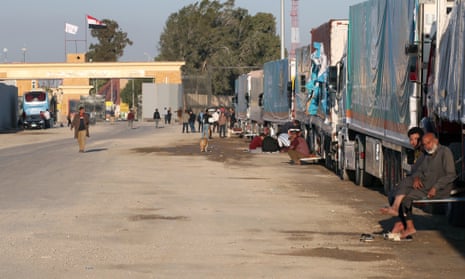
US vice-president Kamala Harris will on Saturday lay out key American objectives for when the Israel-Hamas war ends and stress that the Palestinian people in Gaza and the West Bank should ultimately be reunified under one governing entity, Reuters is reporting.
Harris will make a series of appearances at the Cop28 climate summit in Dubai after being anointed by US president Joe Biden to take his seat at the table as he focuses on the war.
The White House said Harris would carry a message about post-conflict Gaza as the region grapples with the fallout from a war that has upended the Middle East.
A White House official said of her remarks:
She will emphasise that any post-conflict plan for Gaza must include a clear political horizon for the Palestinian people and ensure that Gaza and the West Bank are reunified under one entity.
The western-backed Palestinian Authority governs parts of the occupied West Bank. Hamas seized control of Gaza in 2007 from Palestinian president Mahmoud Abbas’s mainstream Fatah party and has ruled the enclave ever since.
Nearly Palestinians 200 killed, Gaza ministry says, as Israeli strikes continue for second day
Israel carried out deadly bombardments in Gaza for a second day on Saturday after a week-long truce with Hamas collapsed despite international calls for an extension.
Clouds of grey smoke from the strikes hung over Gaza, where the Hamas-run health ministry said nearly 200 people had been killed since the pause in hostilities expired early Friday, Agence France-Prese reports.
Both sides blamed each other for breaking the truce, with Israel claiming that Hamas had tried to fire a rocket before it ended and that it failed to produce a list of further hostages for release.
“What we’re doing now is striking Hamas military targets all over the Gaza Strip,” Israel Defense Forces spokesman Jonathan Conricus said on Saturday.
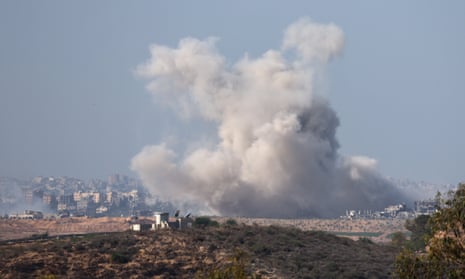
As hostilities resumed, Hamas’s armed wing received “the order to resume combat” and to “defend the Gaza Strip”, according to a source close to the group.
International leaders and humanitarian groups condemned the return to fighting.
UN secretary general Antonio Guterres said on X, formerly Twitter:
I deeply regret that military operations have started again in Gaza
UN humanitarian chief Martin Griffiths said:
Today, in a matter of hours, scores were reportedly killed and injured. Families were told to evacuate, again. Hopes were dashed.
Fears of a wider regional conflict grew after the Syrian defence ministry said Israeli strikes had hit Damascus on Saturday and the militant group Hezbollah said one of its members had been killed in an Israeli strike on Lebanon on Friday.
The US said it was working with regional partners to reach another ceasefire.
Israel wants to carve out Gaza ‘buffer zone’, says report
Israel has informed several Arab states that it wants to carve out a buffer zone on the Palestinian side of Gaza’s border to prevent future attacks as part of proposals for the enclave after war ends, a Reuters report quotes Egyptian and regional sources as saying.
According to three regional sources, Israel related its plans to its neighbours Egypt and Jordan, along with the United Arab Emirates, which normalised ties with Israel in 2020.
The sources also said that Saudi Arabia, which does not have ties with Israel and which halted a US-mediated normalisation process after the Gaza war flared on 7 October, had been informed.
Non-Arab Turkey was also told, the sources said.
The initiative does not indicate an imminent end to Israel’s offensive – which resumed on Friday after a seven-day truce – but it shows Israel is reaching out beyond established Arab mediators, such as Egypt or Qatar, as it seeks to shape a post-war Gaza.
The Reuters report quoted a senior regional security official, one of the three regional sources who asked not to be identified by nationality, as saying:
Israel wants this buffer zone between Gaza and Israel from the north to the south to prevent any Hamas or other militants from infiltrating or attacking Israel
The Egyptian, Saudi, Qatari and Turkish governments did not immediately respond to requests for comment. Jordanian officials could not immediately be reached for comment.
A UAE official did not respond directly when asked if Abu Dhabi had been told about the buffer zone, but said: “The UAE will support any future post-war arrangements agreed upon by all the concerned parties” to achieve stability and a Palestinian state.
Asked about plans for a buffer zone, Ophir Falk, foreign policy adviser to Israeli prime minister Benjamin Netanyahu, said: “The plan is more detailed than that. It’s based on a three-tier process for the day after Hamas.”
The three tiers involved destroying Hamas, demilitarising Gaza and de-radicalising the territory, he said.
Opening summary
Hello and welcome to our continuing live coverage of the Israel-Hamas war. This is Adam Fulton and I’ll be with you for the coming while.
Israel has informed several Arab states that it wants to carve out a buffer zone on the Palestinian side of Gaza’s border to prevent future attacks as part of proposals for the territory after the war ends, Egyptian and regional sources say, according to a Reuters report.
Three regional sources said Israel related its plans to its neighbours Egypt and Jordan, along with the United Arab Emirates, which normalised ties with Israel in 2020, the reports says. The sources also said Saudi Arabia had been informed.
More on that story shortly. In other news as it approaches 7.15am in Gaza City and Tel Aviv:
-
Israel’s military pounded the Gaza Strip on Friday after the end of the truce. Israel launched more than 200 strikes across the territory over the day, including in the densely populated south, where many civilians have fled. The bombardment was most intense in the southern areas of Khan Younis and Rafah, medics and witnesses were reported as saying. Gaza health officials the strikes killed 184 people and wounded at least 589 others, with most of the dead being children and women. Israel has signalled it is preparing to launch a ground assault into southern Gaza in a significant escalation of the war.
-
Israeli prime minister Benjamin Netanyahu appeared to brush aside US calls to pursue a more restrained military campaign as the resumption of hostilities began. Netanyahu said his country’s forces were now “charging forward” and that the plan was for a total military victory.
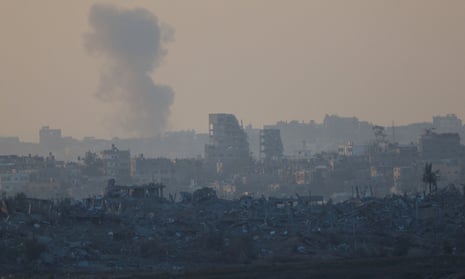
-
Israeli shelling killed three people in southern Lebanon on Friday, the Lebanese state news agency reported, as the end of the Israel-Hamas truce prompted a resumption of hostilities at the frontier. The Iran-backed Lebanese group Hezbollah, a Hamas ally, later said two of those killed were its fighters. It also said it had carried out several attacks on Israeli military positions at the border in support of Palestinians in Gaza. The Israeli army said its artillery struck sources of fire from Lebanon and that air defences had intercepted two launches. The army also said it struck a “terrorist cell”.
-
The head of the UN children’s agency has warned of a “humanitarian catastrophe” if Israeli bombings in Gaza return to the intensity of before the truce. Catherine Russell urged “all parties to ensure that children are protected and assisted” and called for a “lasting humanitarian ceasefire”.
-
Syrian air defences repelled an Israeli rocket attack against targets near Damascus early on Saturday, Syrian state media reported, saying the defences shot down most of the missiles. It said there were no casualties and “only material damages”, and that the strikes came from the direction of the occupied Golan Heights.
-
Israel’s military has set out its plan for the “next stage of the war”: dividing Gaza into dozens of numbered “evacuation areas”, a core part of the military’s plan to gradually take control of the southern part of the strip. Under the plan, people in certain numbered districts of Gaza will be told to evacuate before bombing begins, although how much time they will get is not clear. Leaflets were dropped in parts of Khan Younis, where Israel believes Hamas’s leadership is based, warning citizens to evacuate further south to Rafah.
-
Humanitarian groups said the Israeli warnings would be insufficient because civilians in Gaza were running out of places to evacuate to. Palestinians risked being forced completely out of the territory, they said. Homes in Khan Younis were among the targets struck on Friday hours after the truce expired, and residents were given little, if any, time to flee.
-
No humanitarian aid – including fuel – had been allowed into Gaza on Friday, the head of the UN agency for Palestinian refugees (UNRWA) said. The Palestinian Red Crescent Society said Israeli forces told organisations operating at the Rafah crossing that the entry of aid trucks was prohibited “until further notice”.
-
White House national security spokesperson John Kirby, citing reports from Israel, said Israel had agreed to resume letting truck deliveries through at the urging of the US. But he said truck deliveries would likely be reduced to dozens a day rather than the hundreds of trucks that were getting into Gaza daily during the pause in fighting.
-
The families of hostages being held in Gaza have said they are terrified about the safety of their loved ones after the end of the ceasefire. The relatives of some of the remaining 126 Israeli hostages have said they are grappling with feeling joy for those who have been released while being worried sick for loved ones left behind.
-
The UN said it deeply regretted the resumption of hostilities in the Gaza Strip, calling the situation “catastrophic”. It also said it was concerned by suggestions Israel could seek to expand its military offensive inside the Palestinian territory. The UN’s human rights chief, Volker Türk, urged efforts to be redoubled to try to bring about a ceasefire on humanitarian and human rights grounds.
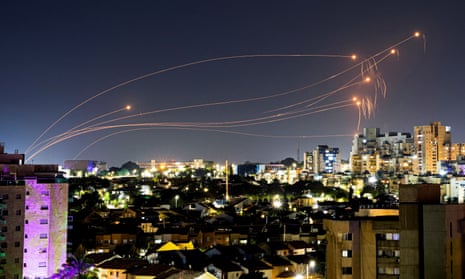
-
Israel has said it will not renew a visa for a top UN official who helps oversee humanitarian aid for the Gaza Strip and occupied West Bank, a UN spokesperson said. Israel’s foreign ministry last month accused Lynn Hastings, the UN’s deputy special coordinator for the Middle East peace process and UN humanitarian coordinator for the occupied Palestinian territory, of failing to be impartial and objective.
-
British prime minister Rishi Sunak described the breakdown of the truce as “deeply disappointing” and issued renewed calls for “sustained humanitarian pauses” in Gaza as he held talks with Israel’s president and the leaders of Egypt, Qatar and Jordan on the sidelines of the Cop28 summit on Friday.
-
Doctors Without Borders/Médecins Sans Frontières (MSF) has blamed the Israeli military for what it called a deliberate attack last month on a convoy that was trying to evacuate people out of Gaza City. In a report that cites several witnesses from the organisation, MSF said “all elements point to the responsibility of the Israeli army for this attack”.
-
The Biden administration has informed Israel that Washington will impose visa bans in the next few weeks on Israeli extremist settlers engaged in violence against Palestinian civilians in the occupied West Bank, a senior state department official said, in the first sign that the US is prepared to publicly distance itself from some of the Israeli government’s actions.
-
A protester with a Palestinian flag self-immolated on Friday outside the Israeli consulate in the US city of Atlanta, Georgia, injuring a security guard who attempted to intervene, authorities said. The protester was reported to be in a critical condition.


